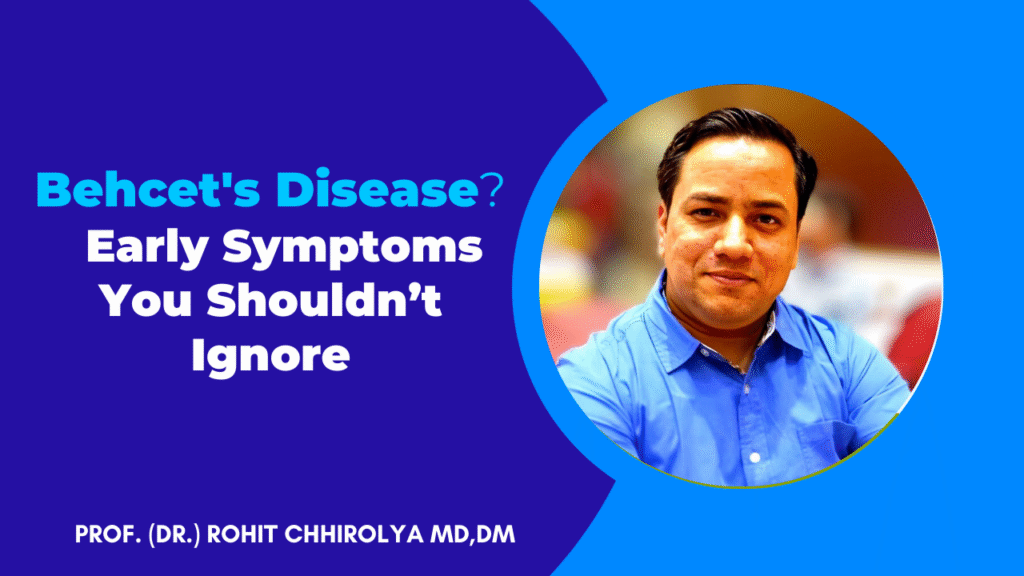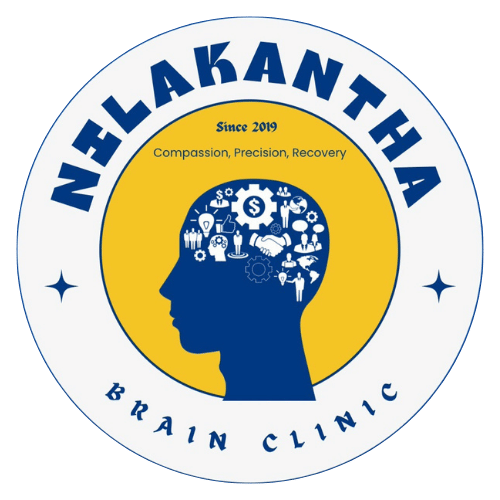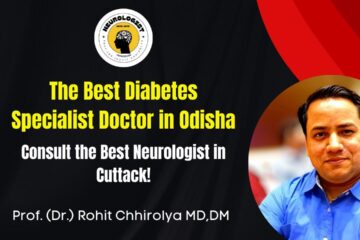Introduction

Behcet’s disease is a rare autoimmune disorder characterized by widespread inflammation that can affect multiple body systems. When this inflammation targets the nervous system—a condition known as neuro-Behcet’s—it becomes a serious neurological emergency. For patients in Odisha, specialized care from the best neurologist in Cuttack is essential to prevent permanent disability. This comprehensive guide covers neurological symptoms, advanced diagnostics, and cutting-edge treatments available at Nilakantha Brain Clinic.
What is Neuro-Behcet’s?
Neuro-Behcet’s occurs when Behcet’s disease—typically known for oral/genital ulcers and skin lesions—affects the nervous system. The inflammation can target:
- Brain parenchyma (causing encephalitis)
- Cranial nerves (leading to vision/hearing issues)
- Blood vessels (resulting in cerebral venous thrombosis)
- Spinal cord (myelitis)
Key Facts:
- 10-30% of Behcet’s Disease patients develop neurological involvement
- Early intervention prevents irreversible brain/spinal damage
- Men aged 20-40 are most commonly affected
Symptoms: Recognizing Neurological Involvement
Primary Neurological Symptoms:
- Headaches (severe, persistent)
- Cognitive impairment (memory loss, confusion)
- Motor deficits (weakness, poor coordination)
- Cranial nerve palsies (facial numbness, double vision)
- Psychiatric symptoms (depression, personality changes)
Systemic Behcet’s Disease Symptoms:
- Recurrent oral/genital ulcers
- Skin lesions (erythema nodosum)
- Uveitis (eye inflammation)
- Arthritis
Red Flags Requiring Immediate Attention:
- Sudden vision changes
- Difficulty speaking or walking
- Severe headache with neck stiffness
Act Now: Consult a neuro doctor near me if experiencing these symptoms.
Causes and Risk Factors
The exact cause remains unknown, but researchers believe:
- Genetic predisposition (HLA-B51 gene association)
- Autoimmune dysfunction (immune system attacks healthy tissues)
- Environmental triggers (viral/bacterial infections)
High-Risk Groups:
- Individuals of Mediterranean/Middle Eastern/Asian descent
- Patients with existing Behcet’s diagnosis
- Those with family history of autoimmune disorders
Diagnosis: Advanced Approaches by Cuttack’s Leading Neurologist
Diagnosing neuro-Behcet’s Disease requires comprehensive evaluation:
- Neurological Examination: Assessing cognitive function, coordination, and cranial nerves
- MRI with Contrast: Revealing brainstem lesions, meningeal enhancement
- Lumbar Puncture: Elevated CSF protein and lymphocytes
- Blood Tests: HLA-B51 genetic testing, inflammatory markers
- PET Scan: Identifying systemic inflammation
Why Choose Nilakantha Brain Clinic?
Dr. Rohit Chhirolya, Cuttack’s top neurologist, utilizes advanced neuroimaging and collaborates with rheumatologists for accurate diagnosis.
Treatment Strategies
1. Acute Attack Management
- High-dose corticosteroids (IV methylprednisolone)
- Immunosuppressants (cyclophosphamide for severe cases)
2. Long-Term Maintenance
- Immunomodulators: Azathioprine, mycophenolate mofetil
- Biologics: TNF-α inhibitors (infliximab, adalimumab)
- Anticoagulants: For vascular complications
3. Symptom-Specific Treatment
- Antiepileptics for seizures
- Analgesics for neuropathic pain
- Physical therapy for mobility issues
Recovery Outlook:
- Most patients show improvement within 2-6 weeks of treatment initiation
- Chronic cases may require long-term immunosuppression
Expert Insight:
“Neuro-Behcet’s demands aggressive early treatment. Delayed care risks permanent neurological deficits.”
– Dr. Rohit Chhirolya, Cuttack’s leading neurologist
Why Specialized Neurological Care Matters
Neuro-Behcet’s mimics multiple sclerosis, brain tumors, or infections. A best neurologist near me provides:
- Differential diagnosis expertise
- Personalized treatment protocols
- Multidisciplinary care coordination
Finding the Best Neurologist in Cuttack
Key Selection Criteria:
- Neuro-rheumatology experience
- Advanced diagnostic capabilities (3T MRI, CSF analysis)
- Biologics infusion facility
Cuttack’s Top Choice:
- Dr. Rohit Chhirolya, DM (Neurology)
- Clinic: Nilakantha Brain Clinic
- Specialization: Neuro-inflammatory disorders, autoimmune neurology
- Contact: 📞 7985022365 | 🌐 Schedule Consultation
External Links:
FAQs
Q1: Is neurological damage from Behcet’s reversible?
A: Early treatment often reverses damage. Delayed care may lead to permanent deficits.
Q2: Can neuro-Behcet’s be fatal?
A: In severe cases with brainstem involvement, yes. Timely care is crucial.
Q3: How often should I have follow-up scans?
A: Every 6-12 months, or as recommended by your neurologist.
Q4: Are there lifestyle modifications that help?
A: Stress reduction, smoking cessation, and regular exercise support treatment.
Q5: Where can I find a ‘cuttack neurology doctor list’?
A: Visit Nilakantha Brain Clinic for specialist referrals.
Q6: Is Behçet’s disease hereditary?
A: While not directly inherited, there is a genetic predisposition (associated with the HLA-B51 gene). Family history increases risk, but environmental factors also play a significant role.
Q7: Can Behçet’s disease affect pregnancy?
A: Yes, it may increase risks of miscarriage, preeclampsia, or flares. Preconception planning with a rheumatologist and neurologist is essential. Many women have successful pregnancies with proper care.
Q8: Are there specific triggers for Behcet’s flares?
A: Common triggers include stress, infections, hormonal changes, and even certain foods. Keeping a symptom diary can help identify personal triggers.
Q9: Can Behcet’s disease cause hearing loss?
A: Yes, inner ear inflammation may lead to sensorineural hearing loss. Sudden hearing changes warrant immediate evaluation by the best neurologist in Cuttack.
Q10: Is there a special diet for Behcet’s patients?
A: No universal diet exists, but anti-inflammatory foods (omega-3s, turmeric, leafy greens) may help. Avoid trigger foods like processed items or excessive sugar.
Q11: How is Behcet’s different from lupus or MS?
A: Behcet’s primarily involves mucocutaneous and vascular inflammation, while lupus targets multiple organs and MS involves demyelination. Accurate diagnosis requires a specialist.
Q12: Can Behcet’s cause mental health issues?
A: Yes, chronic pain and neurological involvement may contribute to depression/anxiety. Integrated care including mental health support is crucial.
Q13: Are there support groups for Behcet’s patients in India?
A: Yes! Organizations like the Behcet’s Society of India and online communities provide resources and connections.
Q14: Can children develop Behcet’s disease?
A: Yes, though rare. Pediatric-onset Behcet’s often has more severe symptoms and requires specialized care.
Q15: Where can I find a Behcet’s specialist in Cuttack?
A: Dr. Rohit Chhirolya at Nilakantha Brain Clinic collaborates with rheumatologists for comprehensive care. Call 7985022365 for referrals.
Key Takeaways for Patients:
- Early intervention prevents complications
- Multidisciplinary care is essential (neurologist + rheumatologist + ophthalmologist)
- Treatment is highly personalized based on symptom severity
For more expert insights, follow:
Have more questions? Schedule a consultation with Cuttack’s leading neuro-immunology expert today.
Take Control of Your Neurological Health
Neuro-Behcet’s presents complex challenges, but with expert care, patients can achieve significant recovery. If you experience neurological symptoms with Behcet’s disease, seek immediate evaluation from Cuttack’s top neurologist, Dr. Rohit Chhirolya, at Nilakantha Brain Clinic.
Act Now for Specialized Care:
📞 Call 7985022365
🌐 Book Online: Nilakantha Brain Clinic
Stay Informed:
- Latest research: Facebook


